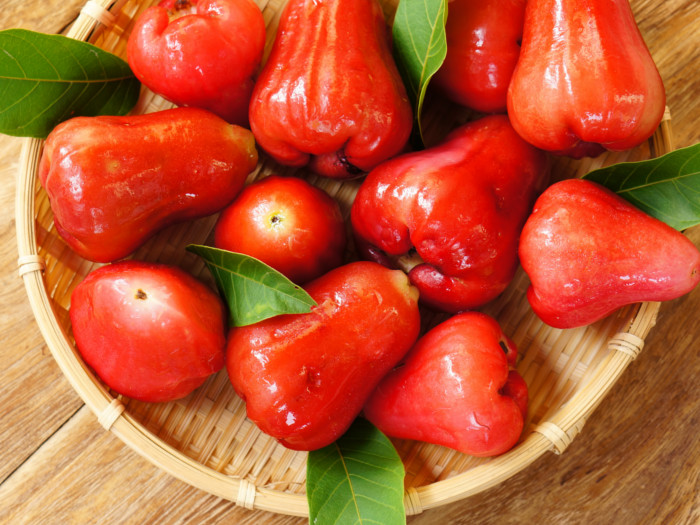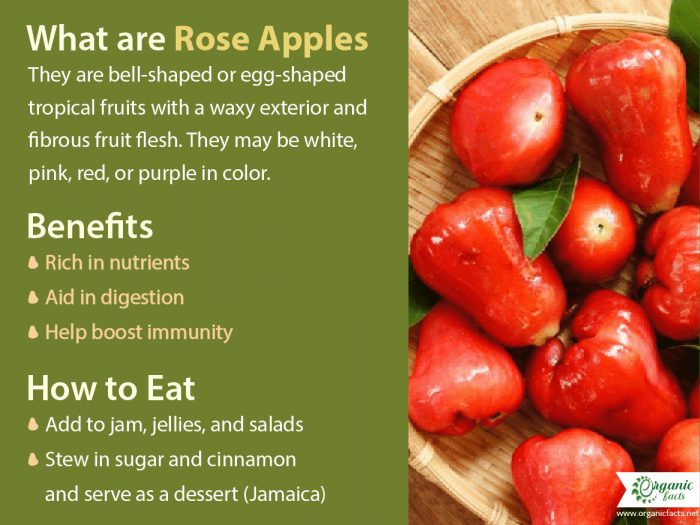Rose apples have several health benefits which may include controlling diabetes, improving digestion, reducing toxicity, promoting heart health, and boosting immunity. Despite the name, rose apples are not related to roses or apples. In fact, they are closely related to guava, and although there are multiple species, the most commonly eaten variety has the scientific name Syzygium jambos. The fruit, bark, and leaves of the plant may have several medicinal properties and were used commonly in folklore remedies. Here, we take a closer look at the top health benefits of rose apples.
What are Rose Apples?
Rose apples are bell-shaped or egg-shaped tropical fruits with a waxy exterior and fibrous fruit flesh. They may be white, pink, red, or purple in color, depending on the regions they are grown in. They are commonly called rose apples as the flesh of the fruit has the delicate sweet taste of rose petals. In different parts of the world, they may be also called wax apples, makoba, love apple, java apple, Semarang rose apple, safed jamun, jamrosa, jambos, water apple, pomarosa, and bell fruit. One popular name for this fruit is jambu – not to be confused with jamun, which is a different fruit in many areas of India. They can either be eaten raw, like apples, or can be used to prepare a variety of dishes, salads, and desserts. [1]
As mentioned, the plant with the scientific name Syzygium jambos is a shrub or a small tree native to Southeast Asia. It spread throughout the world as an ornamental plant. However, it is now considered an invasive species, as it can grow and propagate very quickly, overtaking local flora. [2]
While the egg-shaped variety resembles guavas, they have a very different texture, flavor, and fragrance altogether. Also unlike guavas, rose apples have numerous seeds, this fruit only has one or two large, unarmored seeds in an open, central cavity.

Fresh rose apples, or rosewater apples, are juicy and delicious. Photo Credit: Shutterstock
| Serving Size : | |
|---|---|
| Nutrient | Value |
| Water [g] | 93 |
| Energy | 25 |
| Energy [kJ] | 105 |
| Protein [g] | 0.6 |
| Total lipid (fat) [g] | 0.3 |
| Ash [g] | 0.4 |
| Carbohydrate, by difference [g] | 5.7 |
| Calcium, Ca [mg] | 29 |
| Iron, Fe [mg] | 0.07 |
| Magnesium, Mg [mg] | 5 |
| Phosphorus, P [mg] | 8 |
| Potassium, K [mg] | 123 |
| Zinc, Zn [mg] | 0.06 |
| Copper, Cu [mg] | 0.02 |
| Manganese, Mn [mg] | 0.03 |
| Vitamin C, total ascorbic acid [mg] | 22.3 |
| Thiamin [mg] | 0.02 |
| Riboflavin [mg] | 0.03 |
| Niacin [mg] | 0.8 |
| Vitamin A, RAE [µg] | 17 |
| Vitamin A, IU [IU] | 339 |
| Sources include : USDA [3] | |
Nutritional Value of Rose Apples
Rose apples are high in vitamins A and C, and rich in dietary fiber. According to the USDA, a 100 gm portion of rose apple may have only 25 calories and 0.6gm of protein. They may also contain calcium, thiamin, niacin, iron, sulfur, and potassium. In terms of organic plant compounds, they can even contain jambosine, betulinic acid, and friedelolactone. [4]
Health Benefits of Rose Apples
Although research is limited, some important health benefits have been associated with this lesser-known fruit. Let’s take a closer look.
May Help Control Diabetes
Jambosine is a type of alkaloid found in rose apples, that has shown promising results in regulating the conversion of starch into sugar. This may be an important development for those living with diabetes and who are at risk of developing this condition. Further research is ongoing about the impact of jambosine on blood sugar control. Traditionally in folk medicine, an infusion of roasted seed powder was said to be helpful against diabetes. [5] [6]
May Aid in Digestion
The composition of rose apples – rich dietary fiber combined with high water content – may make them very good for regulating the passage of food through your digestive tract, relieving constipation, and perhaps, more serious health conditions. Also, in traditional medicine, the seeds of the fruit may have been used to prevent diarrhea and dysentery. [7]
May Improve Heart Health
The nutrient combination in rose apples – low in sodium and high in potassium, water, and other beneficial compounds – may have positive effects on lowering blood pressure. Lowering risk for hypertension and protecting heart health may lead to a lower risk of atherosclerosis, thereby preventing cardiovascular complications like heart attacks, strokes, and coronary heart diseases. [8] [9] [10]

Rose apples are high in vitamins A and C, and rich in dietary fiber.
May Boost Immunity
The active and volatile components in rose apple have been linked to having antimicrobial and anti-fungal effects. These antimicrobial and antifungal effects may help protect the skin from developing various infections and can boost the immune system against illness and infectious diseases. [11] [13]
Other Benefits
Although research is still ongoing, the fruit is also thought to potentially benefit other health concerns like epileptic seizures, smallpox, inflammation in the joints, strained eyes, and help in increasing the cognitive ability.
How To Eat Rose Apples?
Rose apples do not last long and are best eaten raw. The indication of its ripeness is the loose seed inside – so just shake the fruit and see if you can hear the sound of the seed hitting against the fruit. If you manage to get a handful of them when in season, here are some delicious ways you can use them.
- Salads: Chop rose apples and toss them in salads for a flavorful bite.
- Jams & jellies: You can combine them with other fruits to make preserves and jams.
- Dessert: They are stewed in sugar and cinnamon and served as a dessert in Jamaica.
How to cut: You can cut a bell-shaped rose apple just like how you would cut a regular pear. Remove and discard the core. To cut the egg-shaped variety, you can slice it into half and remove the seeds. Enjoy!
The fruit is also used to make a syrup to flavor cold drinks. They can also be used to flavor vinegar to use in dishes as well as medicinally.
Word of Caution: The stems, seeds, and leaves of certain cultivars can be highly toxic and contain trace amounts of cyanide. Consume rose apples from trusted markets and avoid excessive consumption of other parts of the fruit besides the flesh and the skin.
